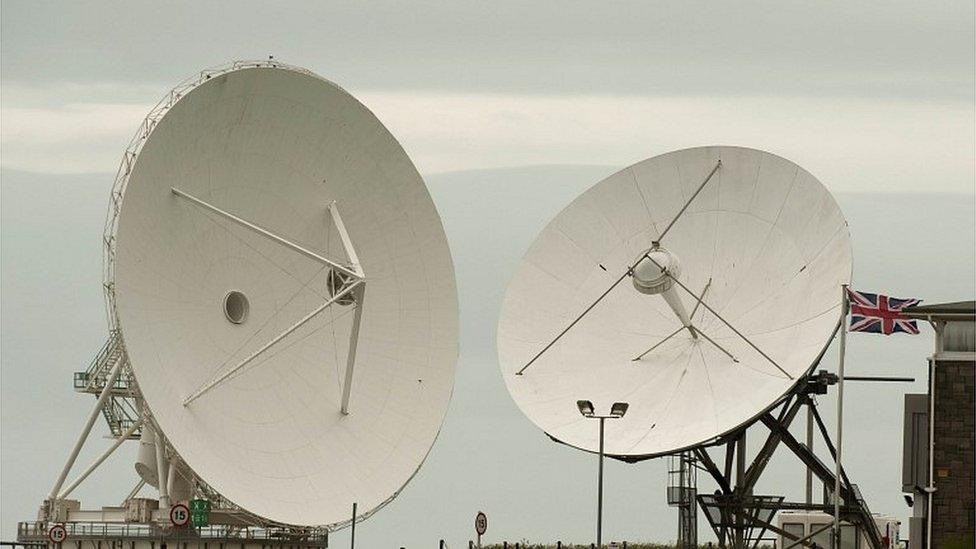Rocky road ahead
- Published
- comments

It's one of the biggest and most significant bills of this Parliament - and it could prove to be very vulnerable to a dangerous combination of Tory dissidents and Opposition parties.
The Investigatory Powers Bill - the new "Snoopers' Charter" to its critics - is the latest attempt to create a legal framework for an armoury of internet surveillance powers, which the government believes are critical to the fight against terrorism, organised crime and online paedophilia.
But because it has to be through Parliament before the end of December, its opponents have a great deal of leverage against it.
The reasons lie in the long backstory behind this latest bill; first, there was the Communications Data Bill, which was dropped by the coalition, after a savaging from a joint committee of MPs and peers.
Then there was the compromise measure DRIPA, the Data Retention and Investigatory Powers Act, which only got through Parliament after a "sunset clause" was added, under which many of the powers it granted would expire at the end of the year.
Which explains the urgency around the Investigatory Powers Act, because a new law has to be in place, to ensure current powers don't lapse after that December deadline.
The bill would provide an armoury of new powers - as the Home Secretary, Theresa May, told Parliament, it would give powers to "law enforcement, the security and intelligence agencies and the armed forces to acquire the content of communications or communications data. These include the ability to retain and acquire communications data to be used as evidence in court and to advance investigations; the ability to intercept the contents of communications in order to acquire sensitive intelligence to tackle terrorist plots and serious and organised crimes; the use of equipment interference powers to obtain data covertly from computers; and the use of these powers by the security and intelligence agencies in bulk to identify the most serious threats to the UK from overseas and to rapidly establish links between suspects in the UK."
To many civil libertarians the proposed powers are unacceptably intrusive, and at the very least extremely powerful safeguards need to be in place around them - the government is offering a "double lock" requiring both the home secretary and a judge to sign off on interception warrants.
This is the kind of issue which could unite Labour (mostly, anyway; there are senior figures with worried about appearing soft on terror), the SNP and the Lib Dems, as well as the modest group of Tory critics around uber-awkward squaddie, David Davis.
We will get an early indication of how co-ordinated these groups are, and how hard they intend to fight on Tuesday at the second reading debate.
There are unlikely to be actual votes against the bill, because no-one wants to be accused of being soft on crime and terrorism, but there could well be abstentions, and some parties could even whip their MPs to abstain.
More time?
And there may also be a bit of action around the programme motion; so big and so significant is this bill, that there are calls for it to be given an unusually long report stage, to allow MPs to propose detailed changes. There is already talk of a two-day report stage; some critics argue for four, and their demands could well be put to a vote.
The real moment of Commons danger will probably come during that report stage (however many days are devoted to it) when cross-party amendments are likely on a range of issues. Again, these are likely to be presented in terms of what is most effective in fighting terrorism and organised crime; there is an argument, for example, that bulk data collection powers result in the security services or the police trying to find a needle in a much larger haystack.
It is probably too early to identify exactly what issues will be pushed - but this is one of those rare measures which might bring together a Commons majority against the government. And it will test the powers of the ministerial team behind the bill - John Hayes, the Security Minister, and Robert Buckland, the Solicitor-General, as well as of the government whips.
A crucial factor in all this is the slightly unlikely, but very real alliance, between Labour's Deputy Leader, Tom Watson, and David Davis, which combines two hardened Commons street-fighters. In fact they may get in an early blow, if they succeed in challenging some of the data retention powers in the European Court. A ruling in their favour there could gut a major part of this bill.
Lords' concerns
And all this is before the bill arrives in the House of Lords, where, of course, the government does not have even a theoretical majority. And the problem for ministers there is that if the bill is to become law by that December deadline, there simply is not the time to override unwelcome Lords amendments by means of the Parliament Act, which gives peers considerable leverage to force the government to compromise.
One possible deal would be to pass a mini-bill simply extending the existing DRIPA powers, while allowing much longer for Parliament to ponder the rest of the Investigatory Powers Bill.
But the Security Minister, John Hayes, told me on Radio 4's Today in Parliament, last week, that that would be a "soft option" and noted that there had been extensive consideration of the bill in draft, by three different select committees, so the issues were hardly new to MPs or peers. But he's clearly braced for a rough few months.